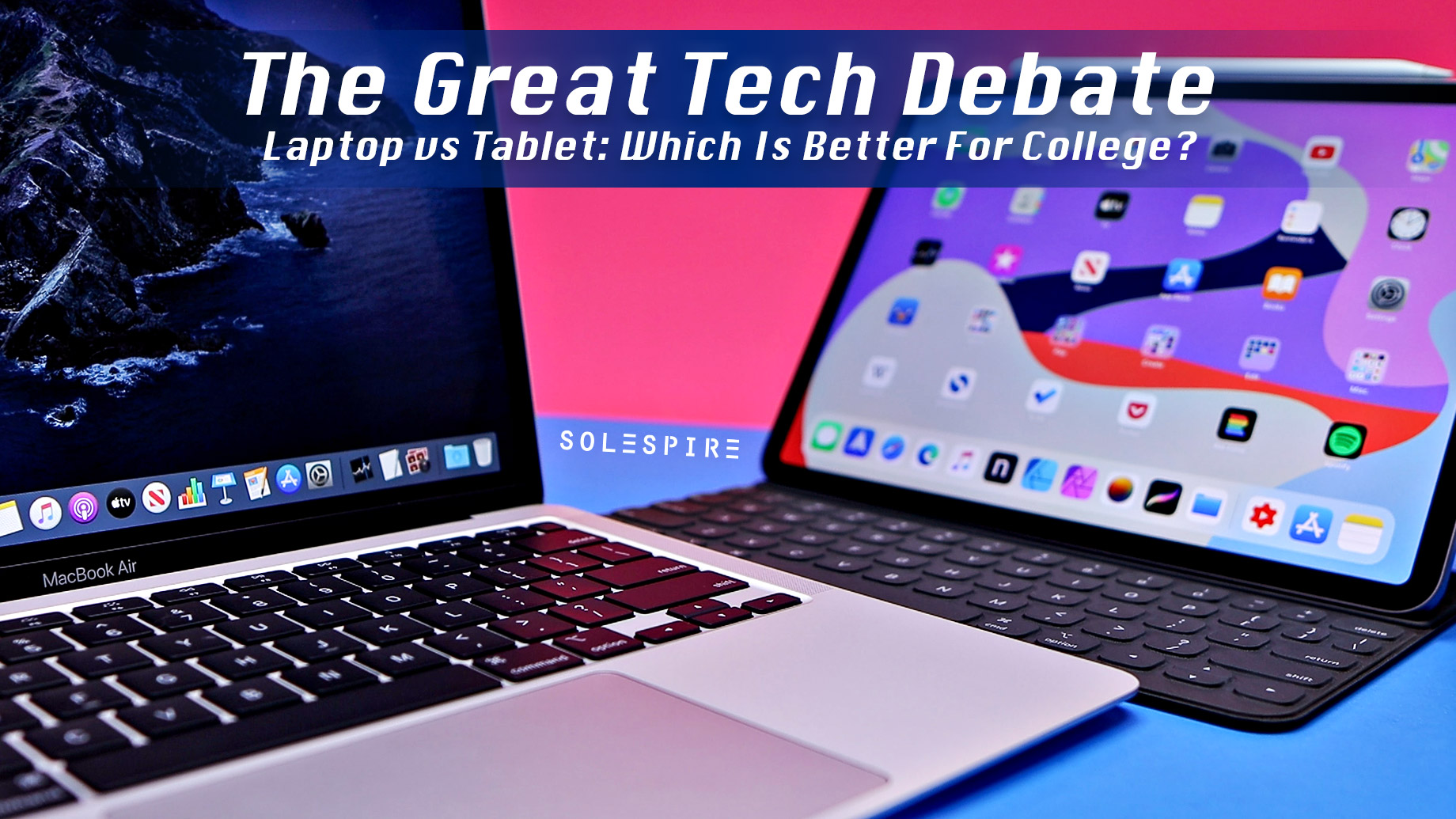
More than 19 million students start college in the U.S. every year. If you or your child is one of those students, you must be equipped with the right tools to succeed.
With virtual or in-person hybrid courses remaining the norm, you need a high-powered device to attend class and complete assignments. This leads us to the question: Laptop or tablet?
While plenty of college students routinely use either device, each has its pros and cons. In this article, we’ll be examining which one makes the best tech for college in 2021.
Read on to discover whether laptops or tablets are better suited for college students.
What’s The Difference Between A Laptop And A Tablet?
You could say that tablets are a variation of laptops in that they’re both portable devices that let you carry out various functions. Their portability is what’s made them such popular choices among college students.
But what are the differences between the two? It generally boils down to a few factors:
- Size: While some laptops and tablets share the same size, the former is much larger and heavier than the latter.
- Cost: Both laptops and tablets feature a variety of prices, and the configurations you want will dictate the final cost.
- Functionality: Laptops might be better suited to handle more strenuous programs and research-intensive schoolwork, while tablets can handle other tasks.
- Keyboard: The physical difference between tablets and laptops is that laptops come packaged with a keyboard while tablets are composed of just the screen.
What Makes A Great Student Laptop?
Let’s look at what makes for an outstanding student laptop. The first factor is screen size.
If you or your child is learning remotely, then a bigger laptop with a larger screen might be better. If they have to use programs that take up a lot of space, a bigger screen will help them see more at once. If they’re on campus and are on the move a lot, a smaller screen will suffice.
Another critical factor is the operating system or OS. Mac and Windows are the most accessible options. If you have an Android or iPhone, consider getting a laptop with the same OS in the case of Android, or with seamless connectivity in the case of iOS or iPadOS with a MacBook, for more convenience.
Storage space is another crucial factor. If you need a laptop that can store many big files, the more storage space, the better. If you want to save money or won’t need much memory, you can opt for smaller internal storage, while considering the cost of cloud storage.
Battery life is crucial if you or your child is going to be in class away from a charger. If you’re learning remotely or always have access to a charger, then battery life won’t be as crucial.
All of these factors will affect your budget. The more extensive features you want, the more it’ll likely cost you.
What Makes A Great Student Tablet?
Are you more in the market for a tablet? There are plenty of great tablets out there for college students if you know how to look for the right one.
One big factor that makes for a great tablet is the accessories. The touch-screen capability does a lot more than you know, and adding a stylus to your toolset can make a big difference.
If you or your child is going into art school or needs to do illustrations, a stylus compatible with a tablet is invaluable, such as an Apple Pencil with the iPad. In fact, there are also many offerings of physical keyboards that can be connected to the iPad, as well as a trackpad, effectively converting the tablet into a laptop.
The biggest draw with tablets is portability. This doesn’t mean that you have to compromise screen size. Many tablets fit easily into your bag, but still have comfortably large screens. This makes for a tablet that’s easy to see but even easier to carry around.
Tablets are generally more expensive because of their high functionality. The final price will depend on whether you buy any additional accessories and the screen size.
Laptops vs. Tablets: Pros and Cons
With all those factors in mind, we still have to contend with all the benefits that tablets and laptops bring to college students. Let’s outline these pros and cons before we compare the two devices side by side.
Laptops: Pros
You never have to worry about readability with laptops since most have at least a 13-inch screen. Many modern laptops offered by Microsoft also have high functionality, meaning they have touch screens and other useful features.
The external keyboard that comes standard with laptops is their biggest plus. Modern keyboards are compact and feel good to use. You can even utilize a keypad on the side if you have a bigger laptop.
Laptops: Cons
Many laptops are not designed with incredibly long battery lives. While they’re sufficient for a class or two, many laptops will reach battery-saver levels after a few hours.
Depending on the model, your laptop might also be pretty heavy. Coupled with books, notebooks, and other things you’re carrying around, lugging around a laptop computer might not be ideal.
If you want a lightweight laptop, you’ll either compromise size and functionality, or pay much more.
Tablets: Pros
The biggest benefit for tablets is undeniably their portability. Even slightly larger tablets fit into your bag and can be taken anywhere.
Most tablets these days are slim and compact, meaning they’ll fit onto almost all college classroom desks. If you’re in a tight studying area, your portable tablet will no doubt fit.
Tablets, depending on the model, also have long battery lives. If you’ve got a long studying night at the library ahead of you, the best tablets give you no reason to worry about dead batteries.
If you take classes that require illustration or more intuitive screen interactions, styluses can be incredibly valuable along with tablets.
Tablets: Cons
If you or your child is engaging in a lot of remote learning, tablets are not exactly the best option here. When the iPad is out of consideration due to its premium price that may be too expensive for college students, other PCs and hybrid laptops, such as the Microsoft Surface series, are better optimized for apps like Zoom, rather than Android tablets. The camera and speaker quality of tablets versus laptops must also be considered.
Tablets tend to have smaller screens, which most buyers aren’t too phased by. However, on-screen keyboards are much clunkier than physical ones. You’ll have to buy an external keyboard for your tablet, which can drive up costs.
Laptops vs. Tablets: Side by Side
Now that we’ve examined the pros and cons, let’s take a look at tablets and laptops side by side. We’re going to examine them based on four categories: Power, price, portability, and battery.
Power
The amount of power you or your child will need depends on their course load and major.
If you want something to take notes with and even write papers, tablets with an external keyboard will do just fine. A smaller laptop will also suffice, but a tablet might be better suited.
If you need to run more advanced programs like SPSS, Photoshop, or Final Cut Pro, you’ll definitely need a Windows PC laptop or a MacBook Pro to handle all the necessary power. In this case, laptops are almost always going to be superior.
Price
This is a tougher category to judge since it again depends on your needs. If you want a powerful device, you’ll have to pay more for a laptop. However, if your classes don’t require you to run big programs, the decision becomes harder.
A $600 laptop will tend to always be more powerful than an Android tablet at the same price. However, you might opt for a cheaper tablet if you only need to take some notes and write emails.
In this case, it’s a tie.
Portability
Tablets, in most cases, takes this category. While there are plenty of smaller laptops designed to fit in your bags, they either compromise power or are more expensive.
With tablets, you get more for what you pay, especially in terms of portability. A light tablet might make all the difference if you’re carrying around books all day for classes.
Battery
While many laptops do have limited battery power when compared to tablets, keep in mind that it’s able to run more programs while unplugged. This category is more or less a tie since both devices’ battery life can degrade over time.
What About A Chromebook?
While deciding between laptops and tablets is indeed a tough choice, Chromebooks might actually be the median between the two. Chromebooks run on Google Chrome’s operating system and are akin to a regular laptop.
It’s more limited in scope in terms of processing power. However, it’s small, lightweight, and incredibly portable.
These features make the Chromebook a popular choice for students across all grade levels, including college students.
The portability makes it ideal for carrying it around campus. Its integrated cameras make it optimal for remote learning. The external keyboard makes note-taking and other functions accessible.
If you’re looking for a bridge between tablets and laptops, a Chromebook might just be the move to make.
Laptop vs. Tablet: Making The Right Decision
College students are contending with both remote and in-person learning environments, which makes the laptop versus tablet debate even hotter. Use this article to help you decide which is the right choice for you, or your incoming college student today.
For more informative articles on consumer electrics, technology, digital media, and other services, check out the rest of our site!
